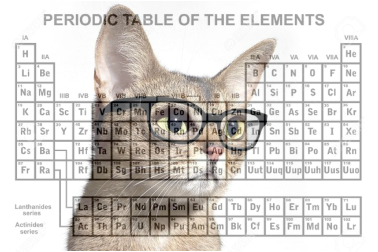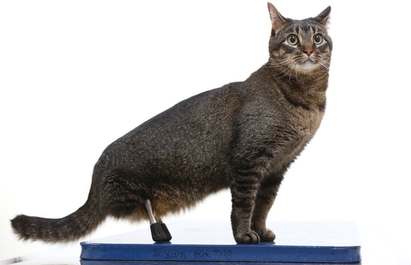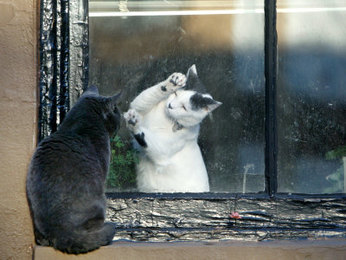Here at Agatha's Lucky Paws, we have an important mission that is close to our hearts in caring for those animals in Sanctuary.
Animals can become Sanctuary Residents for many different reasons.
If you want to learn about how to help Sanctuary Animals, click here.
To learn more about how our Sanctuary works, see below!
Most Sanctuary Animals have extenuating circumstances that are beyond what can be handled by most adopters either at the time or for the rest of animal's future life.
We will explain a little bit more in detail here.
Rehabilitation
1. Long term animals that need rehabilitation or extensive training.
When an animal comes into the rescue, most times we know right away what's wrong and what's right.
For instance, an animal that may have obvious severe injuries or require something like an amputation, we know that it may be a while depending on how bad off they are. Some animals are touch and go for a time and even if they make it through they may be facing a tough road to recovery. Oftentimes the circumstances surrounding how they come in and begin recovery greatly impact the outcome in most cases. Behavioral difficulties can arise even in the best of dogs when they are put under duress or forced to endure long periods boredom while healing. In cases like these, it is not only Physical Rehabilitation that is required, but also Behavior Rehabilitation.
Some animals come into the rescue, and even with all the experience a human has with animals, they are just as mysterious as trying to understand a human being. It isn't until you get to know them, truly know them, that their truth comes out. This could be something cause by prior abuse* or be as simple as just a host of behavioral problems from lack of training that begin to surface one after another. It can be akin to fixing an old car. You start replacing the obvious parts but as you go and the car gets better the other issues become much more obvious (or more mysterious! What is that weird noise....). When this happens to the extreme, it can require months or even years of rehabilitative training. We do everything we can to help them on their way to a new home with the understanding that sometimes the best healer is time and patience.
A great example of this type of situation is Spock who is doing very well now and up for adoption!
When an animal comes into the rescue, most times we know right away what's wrong and what's right.
For instance, an animal that may have obvious severe injuries or require something like an amputation, we know that it may be a while depending on how bad off they are. Some animals are touch and go for a time and even if they make it through they may be facing a tough road to recovery. Oftentimes the circumstances surrounding how they come in and begin recovery greatly impact the outcome in most cases. Behavioral difficulties can arise even in the best of dogs when they are put under duress or forced to endure long periods boredom while healing. In cases like these, it is not only Physical Rehabilitation that is required, but also Behavior Rehabilitation.
Some animals come into the rescue, and even with all the experience a human has with animals, they are just as mysterious as trying to understand a human being. It isn't until you get to know them, truly know them, that their truth comes out. This could be something cause by prior abuse* or be as simple as just a host of behavioral problems from lack of training that begin to surface one after another. It can be akin to fixing an old car. You start replacing the obvious parts but as you go and the car gets better the other issues become much more obvious (or more mysterious! What is that weird noise....). When this happens to the extreme, it can require months or even years of rehabilitative training. We do everything we can to help them on their way to a new home with the understanding that sometimes the best healer is time and patience.
A great example of this type of situation is Spock who is doing very well now and up for adoption!
Hospice
2. Hospice for very aged or terminally ill animals.
Sometimes what we see, isn't so easily seen by others.
Age shouldn't always be a factor when adopting an animal, but all to often it is. We know that when a person who just wants a companion animal to hang out with them and not much else and still go for a much younger pet, or even a baby animal, that it's their emotions they are protecting. As heartbreaking as it is, most animals just do not live as long as people do. Sometimes it is so traumatic for a person to lose their pet that they will never adopt or own a pet again. Our bonds with animals can be stronger than they are with people in some cases. We have even heard more than one person who comes to say hello to the adoptable animals at events say that their pet was their soul mate. While we understand this human behavior and can sympathize with them, it is hard to see a perfectly well behaved and trained dog get looked over again and again because of age, physical abnormality, disability, or because of the only in recent years discovered 'Black dog/cat Syndrome'. This is what the Sanctuary is here for.
A great example of this type of situation is Jazz who was old, disabled, and suffered black dog syndrome. Though we knew she would probably never be adopted and her time was running out, she was a part of the ALPRAS family and remained a Sanctuary Dog for the rest of her life as still 'up for adoption'.
Some of the worst news a person can hear about a loved one is that they have a Terminal Illness such as the 'Big C' (cancer).
Being Terminally ill doesn't mean that you cannot enjoy what life you have left. While in this country we cannot help our human loved ones who are ready to move on do so, we have the power to do this with our animals and end their suffering. Before that happens, we want them to know the love and companionship they deserve. Most of the time when we have a Hospice Animal in the rescue it is either an animal who has developed a congenital defect or was a surprise discovery in an animal just recently brought into the rescue. This is not their fault, they didn't ask for this to happen to them and we will not hold it against them. Though some animals with a terminal illness may live several years and still be adoptable for someone willing to put their heart on the line to give them a home for whatever time they have remaining in their life, we are there if a 'Forever Home' isn't.
We become their forever home until they cross the Rainbow Bridge.
A great example of this type of situation is Caramon who was diagnosed with Cancer and lived a great life in the Sanctuary.
Sometimes what we see, isn't so easily seen by others.
Age shouldn't always be a factor when adopting an animal, but all to often it is. We know that when a person who just wants a companion animal to hang out with them and not much else and still go for a much younger pet, or even a baby animal, that it's their emotions they are protecting. As heartbreaking as it is, most animals just do not live as long as people do. Sometimes it is so traumatic for a person to lose their pet that they will never adopt or own a pet again. Our bonds with animals can be stronger than they are with people in some cases. We have even heard more than one person who comes to say hello to the adoptable animals at events say that their pet was their soul mate. While we understand this human behavior and can sympathize with them, it is hard to see a perfectly well behaved and trained dog get looked over again and again because of age, physical abnormality, disability, or because of the only in recent years discovered 'Black dog/cat Syndrome'. This is what the Sanctuary is here for.
A great example of this type of situation is Jazz who was old, disabled, and suffered black dog syndrome. Though we knew she would probably never be adopted and her time was running out, she was a part of the ALPRAS family and remained a Sanctuary Dog for the rest of her life as still 'up for adoption'.
Some of the worst news a person can hear about a loved one is that they have a Terminal Illness such as the 'Big C' (cancer).
Being Terminally ill doesn't mean that you cannot enjoy what life you have left. While in this country we cannot help our human loved ones who are ready to move on do so, we have the power to do this with our animals and end their suffering. Before that happens, we want them to know the love and companionship they deserve. Most of the time when we have a Hospice Animal in the rescue it is either an animal who has developed a congenital defect or was a surprise discovery in an animal just recently brought into the rescue. This is not their fault, they didn't ask for this to happen to them and we will not hold it against them. Though some animals with a terminal illness may live several years and still be adoptable for someone willing to put their heart on the line to give them a home for whatever time they have remaining in their life, we are there if a 'Forever Home' isn't.
We become their forever home until they cross the Rainbow Bridge.
A great example of this type of situation is Caramon who was diagnosed with Cancer and lived a great life in the Sanctuary.
Safety, Liability, & Disability
Safety

3. Animals unadoptable to the general public for safety, liability, or disability.
Safety is something we will not risk on other people or animals outside ALPRAS
Safety : There are some diseases and conditions that are not safe for the public to deal with.
A Cat who has been diagnosed with FeLV (Feline Leukemia Virus) is Highly contagious to other cats because of how it is transmitted. This is a situation where it is absolutely unacceptable and would be incredibly irresponsible to adopt out a cat suffering this condition*. A cat who has developed FIP (Feline Infections Peritonitis) actively is no longer a direct threat to other cats** because once they begin suffering from its effects, the exposure had happened in most cases long prior. It is often considered on par with an Auto Immune Disorder. The reason we will not adopt out a cat we know has FIP is because the suffering they endure before death can be traumatizing and death can be extremely sudden. What is more, cats who develop FIP are prone to 'going off to die' they will hide and we have heard of cases where the cat who has been missing for days were found dead somewhere in or around a person's home. That is also unacceptable and we will not adopt out a cat who has FIP.
Safety is something we will not risk on other people or animals outside ALPRAS
Safety : There are some diseases and conditions that are not safe for the public to deal with.
A Cat who has been diagnosed with FeLV (Feline Leukemia Virus) is Highly contagious to other cats because of how it is transmitted. This is a situation where it is absolutely unacceptable and would be incredibly irresponsible to adopt out a cat suffering this condition*. A cat who has developed FIP (Feline Infections Peritonitis) actively is no longer a direct threat to other cats** because once they begin suffering from its effects, the exposure had happened in most cases long prior. It is often considered on par with an Auto Immune Disorder. The reason we will not adopt out a cat we know has FIP is because the suffering they endure before death can be traumatizing and death can be extremely sudden. What is more, cats who develop FIP are prone to 'going off to die' they will hide and we have heard of cases where the cat who has been missing for days were found dead somewhere in or around a person's home. That is also unacceptable and we will not adopt out a cat who has FIP.

Please note: FeLV is a terrible disease that affects cats. Older cats who have contracted FeLV may live several years and gain Sanctuary Status here at ALPRAS. The only time ALPRAS will adopt out an Adult Cat with FeLV is if the Adopter has dedicated their house to FeLV rescue haven, these special people are extremely rare and very much cherished in the rescue community. Kittens do not survive FeLV well and most do not make it to 1 year of age(In extremely rare instances they may make it up to 3 years of age). There is nearly no quality of life for a kitten who has FeLV only pain and constant secondary infections. We will do a minimum of 3 separate Snap Tests to verify that a kitten or cat has the disease due to the fact there can be false positives. Usually kittens with false positives will present as healthy robust kittens while those with the disease are more often lethargic or quiet. If it is found that kittens are full positive and showing the correct signs we will humanely euthanize them.
In the case of FIP, it is hard to detect, there is no vaccination for it, and currently no cure*. Due to this, no matter how healthy an animal appears despite being under supervision of rescue and/or veterinarian, it can have a case of FIP that may show up after adoption. It is a heartbreaking situation but one out of everyone's control. If an animal adopted out by us does get diagnosed with FIP, please let us know immediately. We always take back our animals and understand if the animal is returned to us for this reason. In either case, if the adopter(s) choose to keep the animal until it passes or returns the animal to us, we will allow the adopter to choose another cat that fits well into their home without an adoption fee with a copy of their veterinary records.
In the case of FIP, it is hard to detect, there is no vaccination for it, and currently no cure*. Due to this, no matter how healthy an animal appears despite being under supervision of rescue and/or veterinarian, it can have a case of FIP that may show up after adoption. It is a heartbreaking situation but one out of everyone's control. If an animal adopted out by us does get diagnosed with FIP, please let us know immediately. We always take back our animals and understand if the animal is returned to us for this reason. In either case, if the adopter(s) choose to keep the animal until it passes or returns the animal to us, we will allow the adopter to choose another cat that fits well into their home without an adoption fee with a copy of their veterinary records.

* There are studies going on in Europe that have cause some cases of remission and there has been some progress with non-effusive FIP at the Tennessee Veterinary School in 2009 with a reported 3 cases cured. In early spring 2016 scientists did a controlled study with a possible cure in which 6 out of 8 cats survived and remained thus for an observatory 8 months. Currently, naturally occurring FIP has not been tested with this possible cure. This is still an ongoing study and by no means suggests that there is a certain cure for the terrible disease that is FIP.

**Owners of Ferrets need to be aware that there is now a recognized disease of Ferret Infectious Peritonitis which is extremely similar to FIP (Feline). While FECV Ferret Enteric Coronavirus has been known a while, there are no vaccinations for either of these diseases in Ferrets.

For Dogs, any dog who has contracted Parvo (Canine Parvovirus) will not be adopted out unless they manage to fully recover through intensive veterinary intervention. Parvo is nearly always fatal without treatment with a less than 10% survival rate. Dogs (mostly puppies) who do get treatment have a 80 - 95% chance, however, treatment can skyrocket easily into thousands of dollars. We are extremely careful when bringing in a new dog because not only is Parvo so contagious from even casual contact, it can live on ground surfaces for well over a year. Bleach is the only thing that can 'kill' the virus and even then it's no guarantee. It is one of the hardiest Viruses out there and the only way to truly battle it is with Prevention.
Please note: We are still a small rescue and cannot afford to bring in dogs or puppies who have Parvo. We know there are rescues out there who have vastly more funds to handle such a severe disease and may be willing to take on such a huge expense. We will do all we can should an animal we have in our care somehow become a victim of Parvo, however, we do Snap Test every animal who come in the rescue and believe firmly in preventative care with life saving vaccinations.
Please note: We are still a small rescue and cannot afford to bring in dogs or puppies who have Parvo. We know there are rescues out there who have vastly more funds to handle such a severe disease and may be willing to take on such a huge expense. We will do all we can should an animal we have in our care somehow become a victim of Parvo, however, we do Snap Test every animal who come in the rescue and believe firmly in preventative care with life saving vaccinations.
Liability

Liability: Some animals we would be knowingly, legally negligent to adopt out.
Some animals no matter how much you work with them cannot manage to make the changes necessary to make them safely rehomable. Severe cases of aggression, fear, or mental illness would be like sending out a violent criminal or unstable mental patient. Adopting out an Aggressive Animal is just shy of breaking the law in most places and is breaking it in some. Nearly every Animal Control Services department have strict rules regarding 'Dangerous Dogs', and for good reason. Dogs labeled 'Dangerous' have many requirements placed on the owners from City, County, and even State laws and ordinances. Adopting a dog that falls into this category can endanger the public if the adopter doesn't follow every single instruction given by the rescue and/or meeting the regulations of the law. It sets people and dogs up to fail in addition to potentially having legal action attempted to be taken to the adopter should something happen to someone else. It could be also potentially be brought against ALPRAS by the adopter, a victim of aggressive behavior, and law enforcement. No one wins and the one who loses most in the end is usually the dog who will pay with their life. Here in Sanctuary, so long as the animal can be controlled and secure, they will have as fulfilling of a life we can possibly give them without endangering anyone.
Please note: Cats are not exempt from 'Dangerous' status. Any animal can be labeled 'Dangerous' by law if they violently impact the public on more than one occasion or based off the severity of one altercation.
Some animals no matter how much you work with them cannot manage to make the changes necessary to make them safely rehomable. Severe cases of aggression, fear, or mental illness would be like sending out a violent criminal or unstable mental patient. Adopting out an Aggressive Animal is just shy of breaking the law in most places and is breaking it in some. Nearly every Animal Control Services department have strict rules regarding 'Dangerous Dogs', and for good reason. Dogs labeled 'Dangerous' have many requirements placed on the owners from City, County, and even State laws and ordinances. Adopting a dog that falls into this category can endanger the public if the adopter doesn't follow every single instruction given by the rescue and/or meeting the regulations of the law. It sets people and dogs up to fail in addition to potentially having legal action attempted to be taken to the adopter should something happen to someone else. It could be also potentially be brought against ALPRAS by the adopter, a victim of aggressive behavior, and law enforcement. No one wins and the one who loses most in the end is usually the dog who will pay with their life. Here in Sanctuary, so long as the animal can be controlled and secure, they will have as fulfilling of a life we can possibly give them without endangering anyone.
Please note: Cats are not exempt from 'Dangerous' status. Any animal can be labeled 'Dangerous' by law if they violently impact the public on more than one occasion or based off the severity of one altercation.
|
Fear Cases can manifest in various ways and can fall into several categories. The most extreme are either almost entirely shut down, possess widely erratic behavior, or are so out of control in fear that anything sends them into a fight or flight mode. These are some of the saddest cases because it is not a behavior that can just be 'trained out of them' and medication is not always the answer. Time and patience is one of the only ways to handle recovering trust and gaining confidence. Unless a fear case is able to be rehabilitated to an adoptable level or an highly experienced adopter or professional steps up to bring them into their home, they become Sanctuary animals.
|

Mental Illness is the last on this sub list. Just like with people, some individuals are only able to handle or connect to a very select few people who are either relatives or professionals equipped to handle their conditions. Mental Illness can be very scary to outsiders and the patient can be very scared or uncertain of themselves and the world around them. Julien the Rottweiler was a prime example of this. Due to his Physical Maladies as a young dog he developed Fear Case issues. On top of that he sufferd from Severe Anxiety and OCD (Obsessive Compulsive Disorder). It is a perfect storm and it is because of this that he was 'unadoptable'. There are very few people who would have been able to handle him and he trusted far fewer. His rehabilitation was ongoing for his entire life. He was never able to be up for adoption and he always remained a Sanctuary Dog, and we did everything we could to make his life easier and provide quality to it. He was Well Loved and Cherished here and is the Symbol and Poster Dog for the ALPRAS Sanctuary.
Under the label of Liability, we take careful consideration of every animal we bring in. They are fully evaluated and worked with to give them every possible chance. If an animal becomes a Sanctuary citizen due to Liability, the main thing that will cause it is Unpredictable Behavior. Most people struggle to understand anything their dog is trying to tell them. Trainers and Veterinarians have a great trove of knowledge of animals and ways to help them, but don't have all the answers. Animal Behaviorists can decipher a world of dog language through study and observation and can usually tell you what's making a dog (or cat) tick better than anyone, but even they can be stumped or shocked by not being able to read their signs (Usually because they aren't showing any). If the top people working with animals cannot predict what an animal will do, an everyday person does not have much of a chance. This is unfair to anyone involved with the animal actively or passively and again, is usually most unfair for the animal because in the end, they will usually be the ones who suffer most. We would rather hold them in our arms as they leave this world from old age than see them go in a whirlwind of violence and trauma.
Disability

Disability: Some ailments are beyond what people will be able to handle or accept.
Though people are slowly coming to see the Disabled Animals are still wonderful and amazing individuals who can not only live 'normal' lives, but often super enrich the lives of their owners and inspire everyone around them, there is still much stigma and an unwillingness to take on a 'broken' pet. Deaf, Blind, Amputee, and Wheelchair bound dogs are the hardest to find homes for. Panda, a past Sanctuary dog, was Deaf. He was a great dog with a hilarious sense of humor and smart as all get out, but no one wanted him. He was up for adoption all the way until the day he crossed the Rainbow Bridge. He is still loved and missed by those who knew him very much. Though having a deaf dog isn't nearly the back breaking burden people imagine it is, they are looked over time and time again so with that in mind, animals with visually obvious 'defects' are generally outright ignored. Just like with any ALPRAS Animal, we will stick by them until the end and work to find them homes.
Though people are slowly coming to see the Disabled Animals are still wonderful and amazing individuals who can not only live 'normal' lives, but often super enrich the lives of their owners and inspire everyone around them, there is still much stigma and an unwillingness to take on a 'broken' pet. Deaf, Blind, Amputee, and Wheelchair bound dogs are the hardest to find homes for. Panda, a past Sanctuary dog, was Deaf. He was a great dog with a hilarious sense of humor and smart as all get out, but no one wanted him. He was up for adoption all the way until the day he crossed the Rainbow Bridge. He is still loved and missed by those who knew him very much. Though having a deaf dog isn't nearly the back breaking burden people imagine it is, they are looked over time and time again so with that in mind, animals with visually obvious 'defects' are generally outright ignored. Just like with any ALPRAS Animal, we will stick by them until the end and work to find them homes.

Knowing this, there are some specific Disabilities that far outweigh what a person may be able to handle or is safe for others to handle. Some illnesses bring on a barrage of issues that are overwhelming for those in the rescue and we can only imagine how it would be for a potential adopter. Some illnesses or issues also put the animal in the Liability or Safety category as well. A good example of this was a Sanctuary dog Rat Terrier/Deer Chihuahua named Rukia. She suffered from both Localized and Generalized Seizures. She would display some erratic behavior before her seizures that could make her look and sound like a prey animal putting her in danger from other animals, both dogs and cats, as well as Birds of Prey. Sometimes she would become extremely aggressive prior to having a Seizure. This at first was directed only at dogs but soon became towards cats and eventually people she knew and loved. The older she got the progression was worse and less predictable. She even became a danger to herself over time unable to recognize her own body. This erratic behavior coupled with seizures that destroyed a little more of her brain every time eventually led her to be humanely euthanized when she was beyond being able to live a quality of life. Rukia wouldn't have been safe to rehome for her or anyone else with the symptoms she possessed.
|
Sanctuary Animals who become so due to Disability are just like all the animals we bring into the Sanctuary, we are in it for the long haul. We won't feel sorry for them, we will uplift them, and we will never give up on them! Though the reasons an animal becomes a Sanctuary Animal are not generally pleasant, we are determined to give it our all to help lead a quality life as much as humanly and humanely possible. This is where firmly Dedicated Foster Homes and Sponsors can really shine.
|
Frequently Asked Questions

There is no age requirement to become an ALPRAS Sanctuary Resident. Any animal at any age could have complications seen before or discovered after they have come to the Rescue. We are very mindful about what animals we bring into the rescue to make sure we do not over extend ourselves. In fact, we do usually keep at least one very old dog in the Sanctuary rescued from 'death row' from a shelter. However, sometimes (though rarely) a very young dog or puppy has become a resident due to circumstances beyond anyone's control.

Do you have a Facility or Shelter? Not at this time.
We are a small group of Foster Homes, this limits us on how many animals we take in. One day in the future we may be able to create a place for more Sanctuary animals, but right now that is not possible. Because of this we do not knowingly take in a dog or cat that we know has no hope of adoption by the public aside from having one old dog who has been dumped at a shelter at a geriatric age at a time at the Founder's personal residence. If a dedicated Foster Home is willing, they can opt to have one of their Foster Animal's openings be dedicated to housing a Sanctuary Aniamal. These special Foster Homes and Animals are often called 'Furever Fosters' by the rescue community.
We are a small group of Foster Homes, this limits us on how many animals we take in. One day in the future we may be able to create a place for more Sanctuary animals, but right now that is not possible. Because of this we do not knowingly take in a dog or cat that we know has no hope of adoption by the public aside from having one old dog who has been dumped at a shelter at a geriatric age at a time at the Founder's personal residence. If a dedicated Foster Home is willing, they can opt to have one of their Foster Animal's openings be dedicated to housing a Sanctuary Aniamal. These special Foster Homes and Animals are often called 'Furever Fosters' by the rescue community.

Are there any types animals you won't allow in your sanctuary? Yes & No
While we love all types of animals, we are not equipped to take in all types. Some animals require special care or knowledge. If we have a Foster Home or Dedicated Sanctuary Home (or Furever Foster) that knows a lot about or specializes in a type of animal we will allow Sanctuary then. Certain species, such as Birds and Reptiles, can live a very long time, far beyond average pet lifespans.

Are there any Breeds of Dogs that you won't take in? No.
We are a non breed biased rescue.
"We believe in one breed, and that breed is Dog."
Any dog, cat, or other animal that has come into the rescue who needs Sanctuary Status will receive it. Keeping in mind that we want every single animal to find a forever home, sometimes it just isn't in the cards for them. This just means it's in ours to look over them as animal guardians.
Big or Small, gotta love 'em all!
We are a non breed biased rescue.
"We believe in one breed, and that breed is Dog."
Any dog, cat, or other animal that has come into the rescue who needs Sanctuary Status will receive it. Keeping in mind that we want every single animal to find a forever home, sometimes it just isn't in the cards for them. This just means it's in ours to look over them as animal guardians.
Big or Small, gotta love 'em all!

Can I Adopt a Sanctuary Animal? Sometimes.
Some animals will have dual status as both Adoptable and Sanctuary.
This happens when an animal is difficult adopt due to:
- Hospice or being very old
- Having complicated disabilities
- Require tight restrictions on the Adopter
ALPRAS is a full disclosure rescue. We want you to know everything and will never try to hide their issues. It's a part of our code to make the right match the first time every time. This can only be accomplished with honesty and making sure we set up both the animal or adopter up for success. We won't adopt out an animal unless we are sure both animal and adopter can cope with all issues.
Some animals will have dual status as both Adoptable and Sanctuary.
This happens when an animal is difficult adopt due to:
- Hospice or being very old
- Having complicated disabilities
- Require tight restrictions on the Adopter
ALPRAS is a full disclosure rescue. We want you to know everything and will never try to hide their issues. It's a part of our code to make the right match the first time every time. This can only be accomplished with honesty and making sure we set up both the animal or adopter up for success. We won't adopt out an animal unless we are sure both animal and adopter can cope with all issues.

Do you keep Sanctuary and Adoptable Animals separate? Rarely.
We strive to make every animal have as much quality of life as possible and that means having them be a part of the household they reside in. If a Sanctuary Animal is separated from others in any Foster Home it is usually because:
- They have health concerns that either put them or other animals at risk.
- There are Safety concerns to others animals, such as aggression.
- They are healing from a major surgery or illness and need to be kept calm.
A prime example of needing to keep animals separate is a cat who has FeLV. Since it is highly contagious, they could not mingle freely with other cats.
We strive to make every animal have as much quality of life as possible and that means having them be a part of the household they reside in. If a Sanctuary Animal is separated from others in any Foster Home it is usually because:
- They have health concerns that either put them or other animals at risk.
- There are Safety concerns to others animals, such as aggression.
- They are healing from a major surgery or illness and need to be kept calm.
A prime example of needing to keep animals separate is a cat who has FeLV. Since it is highly contagious, they could not mingle freely with other cats.

Do you Euthanize Sanctuary Animals? We are No-Kill. What this means:
"No-kill" means that animals are not destroyed except in cases of terminal and painful illness, or when compassion demands euthanasia because there is no reasonable alternative.
Every ALPRAS animal is a part of our family and this means we will do everything within our means to help an animal live a happy, healthy, quality life.
Only extreme cases can take the matter out of our hands.
"No-kill" means that animals are not destroyed except in cases of terminal and painful illness, or when compassion demands euthanasia because there is no reasonable alternative.
Every ALPRAS animal is a part of our family and this means we will do everything within our means to help an animal live a happy, healthy, quality life.
Only extreme cases can take the matter out of our hands.
If you have any questions about us, the animals in the rescue,
adoption, fostering or how to help:
Please contact us at [email protected]
adoption, fostering or how to help:
Please contact us at [email protected]
Follow us on Facebook at Agatha's Lucky Paws Rescue and Sanctuary or on Twitter @AgathasLuckyPaw
































